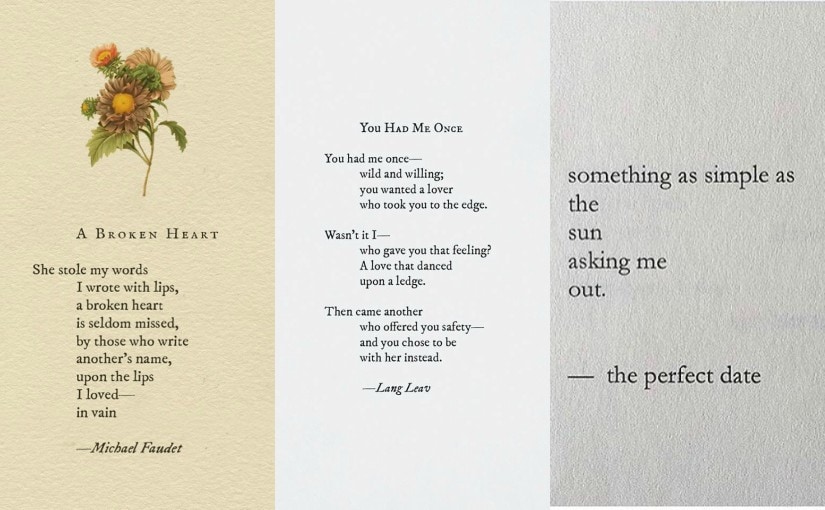rupi kaur is
easy to
criticise, scorn, disapprove of.
isn't she?
People have pointed out that her verses are "just random sentences", "disconnected words" "relatable, rebloggable bullsh*t", "Instagram quotes" and even "self-help for insecure teenage girls". Much of her work feels like the seed of an idea or an excerpt from a poem rather than complete poems in themselves. A lot of the poems in her latest book 'the sun and her flowers' make me ask, "Why is this a poem at all?"
This criticism is not limited to rant-y Facebook posts or endless sub-Reddits; Rupi Kaur is perhaps of the most parodied poets on Twitter, with people imitating her style to write 'poems' of their own on the most inane subjects, such as ordering pizza, or simply posting song lyrics with fancy formatting.
She doesn't seem to be an avid reader, consciously avoiding reading books when writing her own, and being unable to finish one book over the course of a year. Her first instinct when she looks at books by other writers is to wonder how she can take inspiration from their covers. Some might link these tendencies to her alleged inability to write. If this weren't enough, she was also accused of plagiarism by fellow poet Nayyirah Waheed.
But this 24-year-old Canadian Punjabi has earned the distinction of being the writer of the best-selling adult book of 2017 (as of October). Just like pointing out her flaws, it is simultaneously easy to place Rupi Kaur on a pedestal. Her art is not just for art's sake, often delving into subjects such as self-care, women's issues, trauma and body image. She clearly draws from her experiences as a woman of colour, and speaks to this particular demographic too. In 2015, she posted a picture of a woman lying on her bed, whose pants and bed sheet were stained by menstrual blood. Instagram took down the post twice citing the violation of its community standards, and eventually restored it after Kaur put up posts countering and critiquing the platform. It started an entire conversation about how social media continues to censure women who want to talk about menstruation when it allows pornographic, paedophilic content to exist and proliferate — and Kaur emerged as a winner and feminist.
If you were to break down her poetry in the manner of a literature student, you'd be able to say this: She writes free verse. She relies heavily on metaphors which compare life experiences to images found in nature. She talks in first person, often addressing an absent lover and asking him questions. The subjects of her work are the self, her state of mind, and romance and relationships.
Rupi Kaur shares company with other poets who also seem to have constructed their style based on how people consume social media. Of these, Lang Leav, Michael Faudet and Nayyirah Waheed seem to be the most popular. The one defining characteristic of all of these poets is the diligently manicured, minimalist look of their writing. Their sparse writing sits comfortably in the corner of pages adorned with illustrations or motifs, formatted in lower case with line breaks at particular points. But for the subtle differences in their writing style and content, you may not be able to differentiate between these four poets. They are truly 'social media poets'; their work is easy on the eyes and is bite-sized in content, which makes it easy to read when scrolling through one's feed on Facebook or Instagram.
One issue that several people have with Kaur's work is her simplistic, surface-level approach to subjects such as love and heartbreak. The conflicts and concerns seem so commonplace that they don't offer anything new. Consider this poem:
i long
for you
but you long
for someone else
i deny the one
who wants me
cause i want someone else
Critics complain that there is very little meaning to what she writes, which is at odds with the subject matter; most of her work concerns intimacy. Love and heartbreak have motivated poets to write ballads and indeed entire epics, but Kaur restricts her observations and expression to three or four lines consisting of a smattering of words. She focuses on singular experiences — one emotion, one moment, one memory — in each poem. An alternative way of looking at this approach is that it allows her to be easy to relate to. The things she writes about have been experienced by many people, and she presents her subjects in a manner that can be easily consumed.
Kaur is hardly the first poet to write about so-called superficial stuff. Examine this poem by William Carlos Williams, which led to much puzzlement in my English literature class a few years ago, as I imagine it does every time it is read out aloud:
I have eaten
the plums
that were in
the iceboxand which
you were probably
saving
for breakfastForgive me
they were delicious
so sweet
and so cold
There's also the argument that we mustn't pay so much attention to Rupi Kaur because there are so many better poets. That's like saying "Why watch that Adam Sandler rom-com when there are so many Godard movies you could be watching?" This thinking stems from the belief that she does not deserve to be read as much as she is; that more accomplished, talented poets are being overlooked because of her. But what if you're not in the mood to read CP Cavafy's Ithaka, or you never liked Shakespeare's sonnets in the first place? What if Pablo Neruda's raw images never appealed to you, but Rupi Kaur did? Should poetry not cater to your tastes at all?
The irony about the Rupi Kaur phenomenon in poetry is that the criticism of her work seems as superficial as critics claim her works to be.
On the whole, this resistance to Kaur and poets who write in this manner seems more like the resistance to the emergence of something new, which has occurred more than once in the history of literature. When there was an increasing preoccupation with humans and human potential during the Renaissance in Italy, artists were criticised for presenting mortals as being perfect — a virtue reserved only for gods. When war had ravaged several parts of the world between World War I and II and the very purpose of human existence seemed lost, poets like TS Eliot and were questioned for veering too far away from tradition. More than once, poets have challenged what the very definition of poetry is. If the same sort of vehement, elitist opposition and existed every time literature changed, Allen Ginsberg's 'Howl' and Samuel Beckett's Waiting for Godot would never be taught in classrooms and hailed as great works.
On what do we base this judgment of Kaur? Is it fair to compare her with Eliot or Elizabeth Barett-Browning, or even more recent poets like Carol Ann Duffy? Rupi Kaur has an understanding of how social media works and the success of her work is indicative of this. Literature is dynamic, and the works produced in one era are unlikely to adhere to the rules that came in an era before it. And why must they? By asking for Kaur to stop writing, we also deprive a large section of readers of poetry they consider cathartic and relatable. If it is truly helping heal the wounds of women, especially South Asian ones, it means that her work has relevance.
Counting Kaur's name in the list of modern poets is only in line with the belief that poetry should be democratic — that it need not be "high culture" in order for it to qualify as literature. One consequence of Kaur's popularity is that it has prompted other people to begin writing poetry, thus giving budding writers the confidence to express. And that is never a bad thing (you can still sit in your ivory tower and not include it in textbooks).
Insecurity about what the future of literature will be has always been a pressing concern for the literary world. Is this the way poetry should progress? Perhaps not. Do I like Rupi Kaur? Most definitely not. But does denying her work expose our elitism and prove damaging in the larger scheme of things? Most definitely, yes.
Published Date: Jan 24, 2018 15:59 PM | Updated Date: Jan 24, 2018 15:59 PM






















